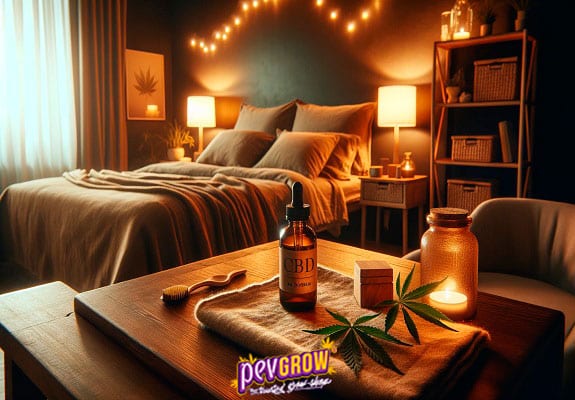- CBD has become an important ally in improving sleep quality. Its natural properties offer a safe and effective alternative for those looking to rest better. In this article, we will see why CBD is good for sleep, how to take it, and other important considerations.
- – Is marijuana good for sleep?
- – What is lucid dreaming? Look here


20-02-2024 09:00:00 - Updated: 20 February, 2024
CBD or cannabidiol, has emerged as a prominent player in the world of natural remedies, especially in terms of improving sleep quality. This compound, extracted from the cannabis plant, has earned the trust of many people struggling with sleep disorders, thanks to its calming and relaxing properties.
In today’s society, where the fast pace of life and constant stress are the norm, restorative sleep has become a luxury for many. This is where CBD plays a crucial role, offering a natural and safe alternative for those who wish to improve their nighttime rest without resorting to traditional medications, which often come with unwanted side effects.
The use of CBD for sleep has been gaining popularity due to its ability to interact with the body’s endocannabinoid system, a complex system that plays an important role in regulating various functions, including the sleep cycle. By influencing this system, CBD can help regulate sleep patterns, promoting a deeper and more continuous rest. This magical cannabinoid has proven to have many therapeutic applications, and if you want to see others besides sleep improvement, I advise you to read this article that talks about the best CBD strains to treat multiple diseases.
The Science Behind CBD and Sleep
Scientific studies have begun to shed light on how CBD positively influences sleep. One of the main benefits of CBD is its ability to reduce anxiety and stress, two of the biggest obstacles to restorative sleep. By interacting with serotonin receptors in the brain, known for their role in mood and anxiety regulation, CBD can contribute to an overall sense of calm and well-being.
Additionally, research suggests that CBD can influence the sleep cycle by reducing the incidence of disorders like insomnia. By improving sleep quality during the deep sleep phase, CBD not only helps you fall asleep faster but also to maintain uninterrupted sleep, which is essential for the body’s repair and restoration process.
CBD has also shown potential in treating sleep disorders related to medical conditions such as chronic pain and restless leg syndrome, both known to interfere with a person’s ability to reach a state of deep and restorative sleep.
In summary, while research on CBD and sleep is still in its early stages, the current results are promising. It offers hope for those seeking a natural solution to improve their sleep, without the side effects that often accompany conventional treatments. With the growing interest in holistic well-being and natural remedies, CBD is positioned as a key component in the quest for a peaceful and restorative night’s sleep.
How to Take CBD for Sleep
The consumption of CBD to improve sleep can vary depending on individual preferences and the specific needs of each person. Research has shown that CBD can have a positive impact on sleep due to its ability to act on the endocannabinoid system, which regulates important functions such as the sleep-wake cycle.
Ideal Time to Take CBD
It is suggested to take CBD one or two hours before bedtime. This allows the body enough time to process the CBD, thus facilitating its relaxing and sleep-promoting effect. Additionally, as CBD can influence the reduction of anxiety and stress, taking it before bed can help induce a more relaxed state, conducive to sleep. However, high doses of CBD (300-600 mg per night) may have a sedative effect, while lower doses could promote wakefulness, so it is crucial to find the right dose for each individual.
Methods of Consumption
There are several methods to consume CBD, such as oils, capsules, and sublingual drops. Each method has its own advantages and times of effectiveness. For example, sublingual administration of CBD, such as the use of oils, is relatively quick and may be ideal for taking after dinner or before bedtime, although it is important to consider the legality of this method in each country. Oral administration, such as in capsules or in food, takes longer to take effect since the CBD must be metabolized by the digestive system. Another option is inhalation through vapes or e-liquids, which provides almost immediate effects.
These methods can vary in terms of speed and duration of effect, and their choice will depend on personal preferences and individual response to CBD. It is important to start with low doses and adjust them according to the body’s response and need, and it is always advisable to consult with a health professional before starting any treatment with CBD.
How Many Drops of CBD to Take for Sleep
The dosing of CBD to improve sleep is a crucial aspect and should be adjusted individually. There is no single dose that is effective for everyone, as it depends on factors such as body weight, metabolism, and individual sensitivity to CBD.
Proper Dosage of CBD Drops
It is advisable to start with a low dose of CBD drops and increase it gradually to find the right amount that suits your needs. Generally speaking, the number of drops needed can vary. For example, it is mentioned that the number of drops needed for a deep and restorative sleep can range from 9 to 20 drops per day. The exact amount of CBD in each drop can depend on the product’s concentration. For instance, if a 10 ml bottle contains 500 mg of CBD, each drop would provide approximately 2.5 mg of CBD.
Personalizing the Dose
It is vital to listen to your body and adjust the dose according to individual response. It is suggested to keep a record of how you feel after taking CBD for sleep and adjust the dose as needed. A gradual and controlled approach is key to finding the optimal dose that improves sleep quality without causing unwanted side effects.
Moreover, it is important to note that CBD can interact with other medications and potentiate the effects of alcohol or other central nervous system depressants. Therefore, it is recommended to talk to a doctor before starting to take CBD for sleep, especially if you are taking other medications.
In summary, the dosing of CBD to improve sleep is a personalized process that must be carefully adjusted. Starting with a low dose and gradually increasing it, under the supervision of a health professional, is the safest and most effective approach.
How to Take CBD Oil for Sleep
CBD oil has become popular as an effective option for improving sleep quality. Its use is supported by studies that demonstrate its positive impact on the sleep-wake cycle and in reducing issues such as anxiety and chronic pain, factors that can negatively affect sleep.
Benefits of CBD Oil on Sleep
Studies have shown that CBD can positively influence sleep by interacting with the endocannabinoid system, which plays a crucial role in various metabolic functions, including the regulation of the sleep-wake cycle. It has been observed that CBD can decrease neural activities that negatively affect sleep, thus improving episodes of pain, anxiety, and promoting a more restorative sleep.
Instructions for Using CBD Oil before Sleep
For effective use of CBD oil for sleep, it is recommended:
- Take it before going to bed: The administration of CBD drops, in an amount that depends on the concentration and individual need, is suggested to be done at least two or three hours before bedtime. This allows the properties of CBD to begin acting in the natural sleep process.
- Maintain a consistent routine: Incorporating CBD oil into a nighttime routine can be beneficial, especially for people with sleep disorders.
- Dosage: The dose of CBD for sleep depends on individual factors such as the underlying condition affecting sleep. It is advised to start with low doses and adjust them progressively. For example, you can start with 5 drops about 30-45 minutes before bedtime and adjust the dose as needed.
- Administration: It is recommended to place the CBD drops under the tongue and hold them for about 30 seconds before swallowing. This facilitates the absorption of CBD into the sublingual capillaries and its entry into the bloodstream.
It is important to mention that the oral use of CBD is not regulated in all countries. In some places, such as Spain, the use of CBD oil is restricted to topical applications, while in others, such as Switzerland, its oral use is allowed.
Tips for Effective Use of CBD
The use of CBD to improve sleep quality can be more effective if integrated into a consistent and healthy sleep routine.
Combination with Sleep Routines
Integrating CBD into your nighttime routine can enhance its effectiveness. To do this, it is recommended:
- Establish a regular sleep schedule: Keeping a fixed time to go to bed and wake up helps regulate your biological clock and improve sleep quality.
- Avoid prolonged naps during the day: Naps longer than 45 minutes can interfere with nighttime sleep.
- Reduce the consumption of alcohol, tobacco, and caffeine: Avoiding these substances several hours before sleep can facilitate a more restorative sleep.
- Create a suitable environment for sleeping: A dark, cool, and quiet room, with a comfortable bed, promotes better rest.
- Avoid stimulating activities before sleep: Intense exercise, use of electronic devices, or watching television just before sleeping can affect sleep quality.
Safety Considerations
It is essential to consult with a health professional before starting to use CBD, especially if you are taking other medications, to avoid interactions and ensure safe use. Additionally, it is important to choose high-quality CBD products and verify their purity and potency.
Additional Tips on Using CBD for Sleep:
- Consult with a health professional: Before using CBD to treat insomnia or any sleep disorder, it is important to get proper guidance.
- Find the right dosage: Start with a low dose of CBD and gradually increase until you achieve the desired effects on your sleep cycle.
- Take CBD before bedtime: For CBD to take effect, it is recommended to consume it at least one hour before bed.
- Practice good sleep habits: CBD is not a magic solution, so maintaining healthy sleep practices is essential to maximize its benefits.
CBD has proven to be beneficial for improving sleep quality, especially in people with disorders related to stress, anxiety, and chronic pain. Additionally, CBD can activate the CB1 receptor, influencing the release of neurotransmitters and improving the sleep-wake cycle.
Conclusion: Improve Your Sleep Quality with CBD
CBD offers a natural and effective solution for improving sleep quality. Experimenting with different methods and dosages can help you find the perfect combination for your needs. Now that you’re clear that cannabidiol can be your ally when it comes to going to bed, I recommend reading this other article that talks about the best cannabis strains rich in CBD, so you can choose your favorite.
FAQs
- Does CBD cause dependency? No, CBD is not addictive and is safe for long-term use.
- How long does it take for CBD to take effect? Generally, CBD takes between 20 minutes and an hour to take effect.
- Can I use CBD if I take other medications? Consult with your doctor before combining CBD with other medications.
- Can CBD help with disorders other than insomnia? Yes, CBD has been used to treat a variety of conditions, including anxiety and chronic pain.
Sources:
- Nutricionyfarmacia.com
- Leafwell.com
- TheBeemineLab.com
- The Beemine Lab
- Cannactiva
- TheGreenDrop.





